Immigration in central Iowa
5/31/2023With a country built on a diverse population, the United States and immigration go hand in hand — and that includes Iowa. Even while located in the middle of the country, almost as far away from the coasts as possible, diverse communities are present in the Hawkeye state, including Des Moines.
A myriad of factors have caused those from various walks of life around the globe to immigrate to Des Moines. Wars, civil unrest and persecution have forced individuals out of their home countries in search of safety. Others seek better opportunities and a better life for their families in search of the “American Dream.”
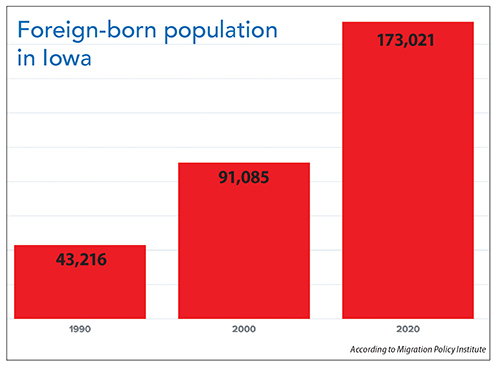 Refugees and immigrants in Iowa
Refugees and immigrants in Iowa
Iowa has a history of accepting immigrants and refugees. In 1975, late Gov. Robert Ray made a dramatic change to the landscape of diversity in Iowa. When President Gerald Ford urged states to take in refugees from war-ravished Asian countries such as Vietnam, Laos and Cambodia, Ray supported the efforts.
“I didn’t think we could just sit here idly and say, ‘Let those people die.’ We wouldn’t want the rest of the world to say that about us if we were in the same situation. Do unto others as you’d have them do unto you,” said Ray, who died in 2018, in an interview with Iowa Public Television for a documentary on refugee resettlement in Iowa.
The U.S. State Department had limitations on how many people could relocate to the same place at once. However, as a result of Ray’s efforts, President Ford made an exception. By 1977, 1,400 Tai Dam refugees were living in Iowa.
The number of foreign-born people living in Iowa has steadily increased since. In 1990, 43,316 people, 1.6% of Iowa’s population, were foreign-born. By 2000, the number was 91,085, or 3.1% of the population, and, by 2020, the number was 173,021, or 5.4%, according to Migration Policy Institute (MPI) figures.
Of the 173,021 foreign-born people living in Iowa in 2020, 21.9% were white, 16.5% were Black or African American, 28.8% were Asian, 13.7% were listed as “other” race, and 17.4% were two or more races. Latinos of any race make up 34.1% of the total, according to the MPI.
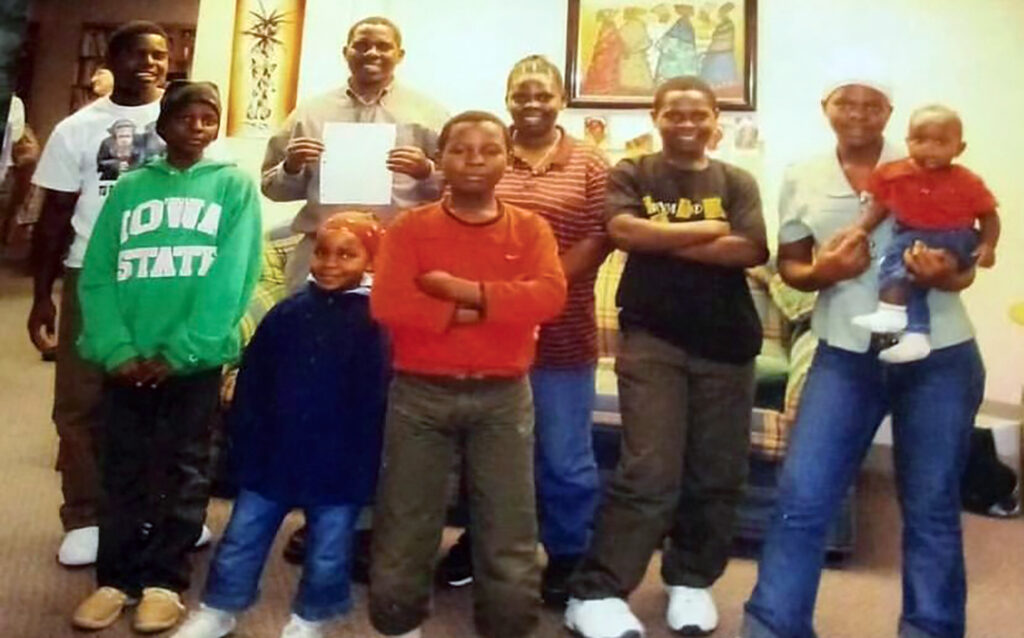
Adolphe Nimenya, in front of his family, shortly after immigrating to Des Moines in 2008.
Stories of two immigrants
Numbers and data can only tell so much. It is immigrants like Adolphe Nimenya and Love Adjei who can provide the personal perspective in Des Moines.
Nimenya has been living in Iowa since 2008. His mother was pregnant with him when his family moved out of Burundi into a refugee camp in Tanzania in 1996. Burundi was experiencing a civil war that led thousands to flee the country. After spending 11 years living in the refugee camp, Nimenya and his family were given the opportunity to either move back home or come to the U.S. Without having anything to go back to in Burundi, his family saw this as an opportunity for a better life and decided to make the move across the Atlantic. They found themselves in Des Moines.
Adjei’s story is one of hardship and perseverance to make the most out of her life in Des Moines. Illuminated by flashlights from her brothers while on a Zoom call from Liberia, where she had gone for a family emergency, Adjei describes a journey that saw her leave Africa at 7 years old and move to Des Moines with an adopted family in a situation she described as “a miracle.” Her journey included experiencing houselessness while in high school, sleeping in apartment hallways until saving up enough money to afford her own apartment, working in the fast food industry, graduating high school and college, meeting and dancing on stage with Michelle Obama, and, finally, owning businesses.
Adjei and her family were able to make it to the U.S. through the Diversity Visa Act that was implemented in 1990 as a way to diversify the immigrant population in the U.S. It’s a lottery system that, as of 2022, has seen 480,000 people immigrate to the U.S.
“You have a far better chance of winning money in the lottery in America than you do with winning this one. So, it was like a miracle. It is a miracle,” said Adjei.
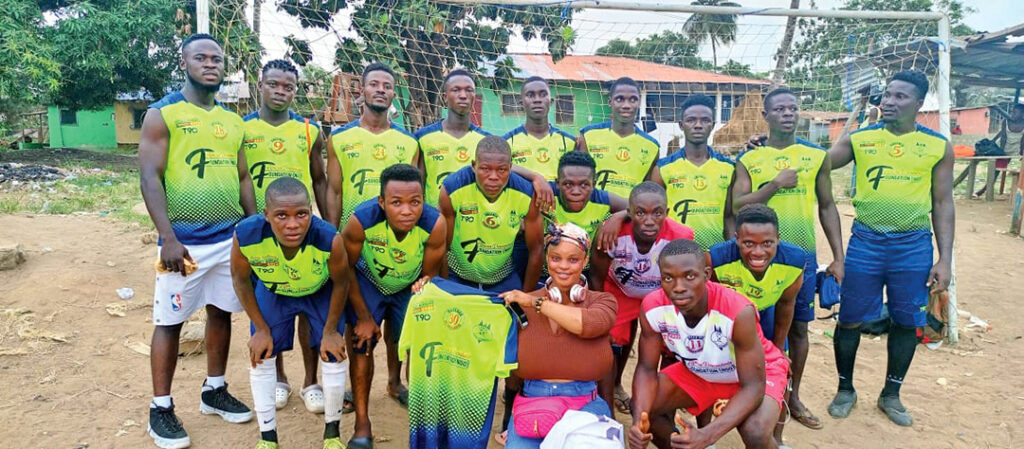
Love Adjei in front of the Frank Talawally football/soccer academy home group she started in Liberia.
Nimenya and Adjei arrived in Iowa in different ways and faced separate challenges. Nimenya came during an Iowa winter in 2008. He faced an immediate contrast from his home country to his new one, and the weather is one of the continuing challenges he’s experienced since moving here.
“Nobody can ever get used to that (the cold weather). I haven’t really got used to that still,” said Nimenya.
Adjei started working at fast food restaurants only a few years after moving from Liberia to save up as much money as possible.
“I basically saved up until I felt like I could get my own start somewhere because I’ve always wanted to work for myself,” said Adjei.
A hurdle for both Nimenya and Adjei was the language barrier, with the English language being one of the most difficult to master.
“Even though I like to say I learned English really fast, the language is one of the toughest things to get used to,” said Nimenya.
Adjei said this was one of her biggest challenges once moving here, but Iowans have helped her tremendously. Part of this can be credited to her teachers, whom she thanks for assisting her throughout her time in Des Moines Public Schools. She names Mark Adams, her fifth grade teacher (now principal at Brubaker Elementary) for going above and beyond and treating her the same as he would any of his other students. Mrs. Mackey, who wasn’t one of her teachers, would help her pay for her family’s groceries out of her own pocket when they couldn’t afford to eat. And Mrs. Leeper made her feel like she was one of her own children, Adjei said.
As she set out to be an entrepreneur, Adjei said Matthew Winslowski from Bank of America helped her get started in her individual business ventures — not in terms of offering loans, but with advice and support.
Moving to one of the least diverse sections of the country was intimidating, said Nimenya. But he sees change.
“It’s getting there. It’s going to become more diverse as we go forward, but it’s still not there. But I think that diversity is what’s helping (Des Moines) become one of the best cities out there,” said Nimenya. “Yeah, it’s a very good place for new people to come into.”
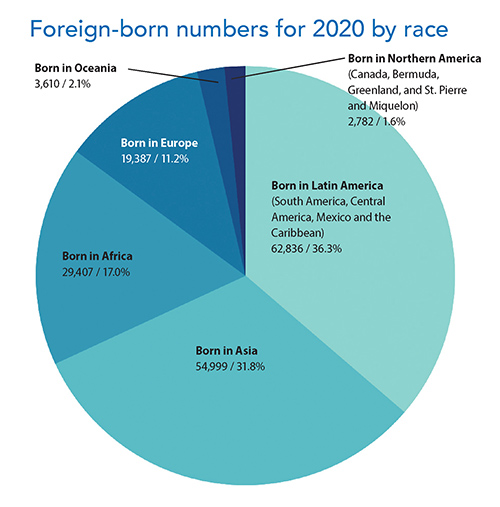 Nimenya says he has been able to accomplish a great deal in his time here and cites the education he’s been able to receive as a reason.
Nimenya says he has been able to accomplish a great deal in his time here and cites the education he’s been able to receive as a reason.
“That was a dream of my parents and a lot of refugees and immigrants. The biggest dream they have for their kids is education,” he said.
Nimenya has been able to fulfill his parents’ dream by graduating from Des Moines Lincoln High School and then from Iowa State University. These institutions are the ones he credits the most for making his transition into life in the states easier.
Adjei was also able to complete her education after graduating from Hoover High School and Concordia University-St. Paul.
Adjei noted that she feels much safer since coming to Des Moines.
“I’m so fortunate to have been put in Des Moines because Des Moines is very safe compared to other states. Not just other states, but other countries. Des Moines, and Iowa, in general, is by far, the safest you’ll get,” said Adjei.
Nimenya said living in Des Moines also provides more opportunities to pursue one’s interests. He said people are more individualistic here, and that’s not necessarily a bad thing.
“I don’t have to live the life that my parents lived. I don’t have to do what everybody else is doing. I can do my own thing.”
In terms of her experience with people she has met in the U.S., Adjei said, “Other places that I have traveled to, they’ve always said that the people in Iowa are much nicer. People in Iowa and in Des Moines specifically are much nicer, more helpful, very kind. Not judgmental.”
Both Nimenya and Adjei said the “American Dream” isn’t clear-cut.
“It depends on how you look at it,” Nimenya said, adding that it’s not a black-and-white, step-by-step process but rather what you make of it.
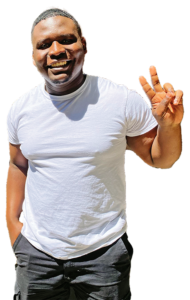
“Deep down in my heart.
I really love this place…
I would say it
gave my parents
a second chance.”
— Adolphe Nimenya
“For my parents, it wasn’t their dream to come to America, or achieving the American dream. It was for their kids to have a better life, to have a future. Everybody tells you to follow what they think is the American Dream. You know, in my opinion, it’s something you need to find yourself. That’s what the American dream should be about.”
Nimenya now works in the restaurant industry following his passion for food.
“The American dream is so real,” Adjei said with passion. “And I’m living it; I’m currently living it. You’re in the best place to achieve your dreams. Everyone thinks Des Moines is so small, but they have no idea how many great people there are here.”
Adjei owns the businesses Love Adjei Investments LLC, LC Nails and, most recently, a laundromat. She has started two projects in her home country of Liberia in hopes of spreading some of her success back into the community there. One of those is a young women’s charity home and academy. Due to the poverty in Liberia, women aren’t faced with many positive solutions to provide for their families, and Adjei hopes to change that.
She also started The Frank Talawally (named after her father) football/soccer academy home to assist young men in Liberia who face difficulties extending their education or finding work.
“I am hoping that, after investing in both projects, we will be able to create future leaders from the projects and, in the long run, reduce the corruption in Liberia,” said Adjei. These projects wouldn’t have been possible if not for her success in Des Moines, she said.
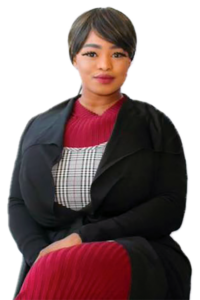
“We were and still are fortunate to have been in the U.S. period. Being in the U.S. is probably, it actually is, the greatest blessing that I will ever get.”
— Love Adjei
Help offered
While Iowa does boast a general Midwestern, welcoming, neighborly charm, refugees and immigrants still face discrimination on top of the challenges of language barriers, finding work and resources, and navigating bureaucracy. Among the organizations helping refugees are:
• The Iowa Bureau of Refugee Services (BRS), a federally funded office of the Iowa Department of Human Services that works with resettlement agencies across Iowa.
• Refugee Alliance of Central Iowa, a voluntary membership network of service providers, government agencies, religious groups, nonprofit organizations, and educational institutions that work together to better serve the needs of the growing refugee population. It provides targeted assistance in the areas of health, housing and transportation, interpretation, education and legal, along with advocacy at the federal, state and local government levels.
• EMBARC helps refugees through advocacy, education and community development throughout Iowa. As Iowa’s first refugee-led social service organization, EMBARC offers support and resources for refugees in need. These resources include a wide range of educational and healthcare programs, as well as access to housing, food, job opportunities, mentoring and more.
These and other organizations aim to help refugees and immigrants connect with resources that will assist them with needs ranging from food and shelter to English lessons, job placement and more so their transitions to life in Des Moines can be as successful as that of Nimenya and Adjei. ♦


















